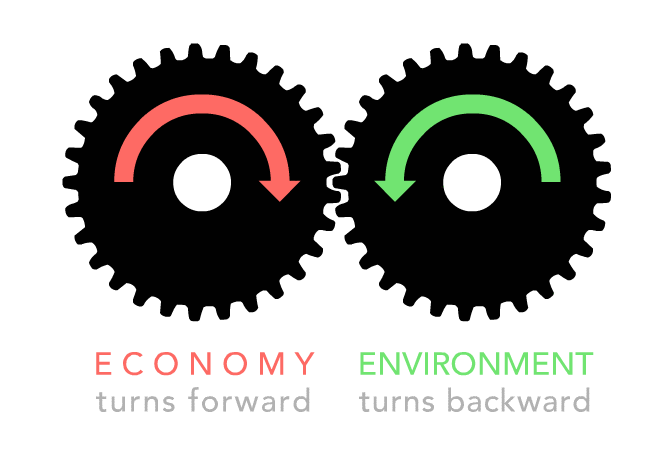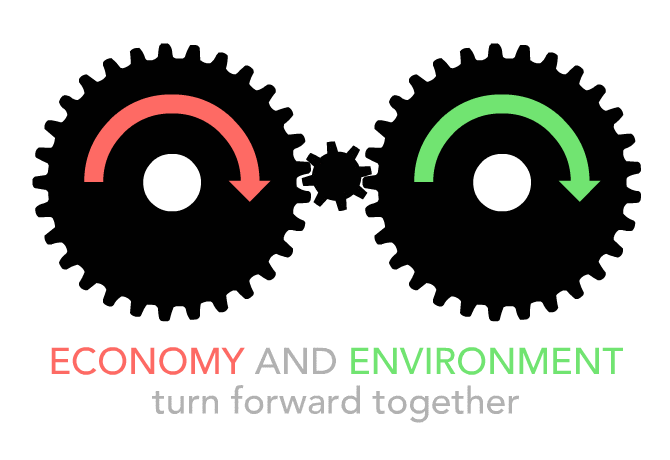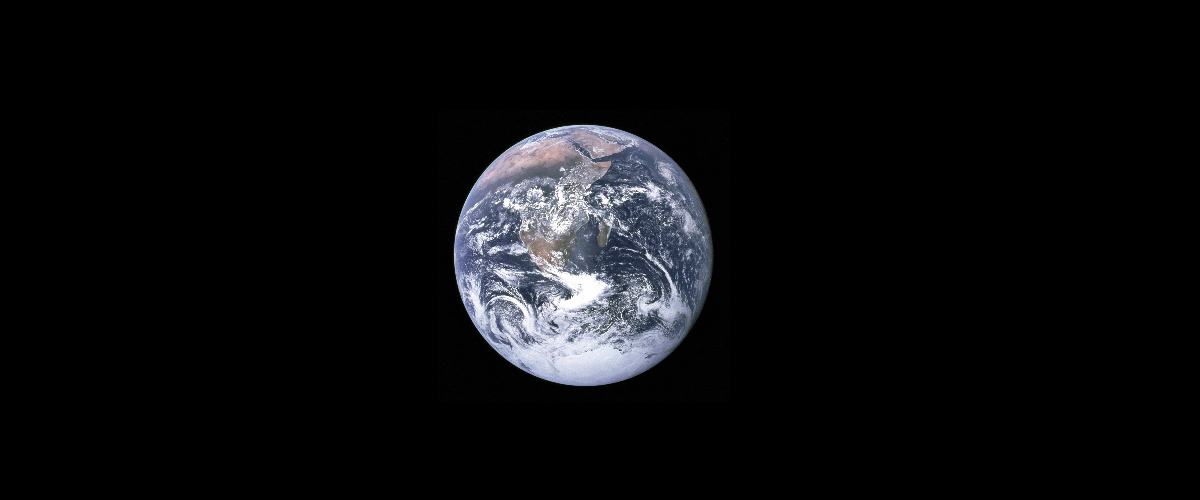A lot of people – on all ends of the political spectrum – believe it's the environment versus the economy. Climate versus capitalism. Mother Nature versus markets.
I've run out of alliterations, but my point is: what if this isn't a zero-sum game? What if we could find win-win solutions – ways to be a good steward of our environment without costing jobs, heck, maybe even create jobs across the nation? In such a politically polarized time, finding solutions that help our environment and economy isn't just pragmatic, it may be our only option left.
Maybe one reason our world is so messed up is because we think in linear cause-and-effect: A causes B, B causes C, and so on.
But the world isn't linear, it's LOOPY: A affects B, but B also affects A. This is why even small changes in our climate can reinforce itself, a vicious cycle, snowballing into something dangerous:
play with the simulation below:
Here's another "reinforcing" loop:
But wait, you might ask even though this is a blog post so I can't hear you, doesn't Nature also have self-correcting loops? Doesn't Nature balance itself?
And actually – yes! Here's one such "balancing" loop:
And no, I didn't get this idea from some conspiracy theorist WordPress blog with a black background and The Matrix-style font. I got it from NASA: carbon dioxide is making the Earth greener – for now.
So the real question is: can this "balancing loop" of plants sucking up CO2 offset the "reinforcing loops" of the ice caps and tundra melting? Especially if you keep adding CO2? Well, let's find out...
Probably not...? Well, that's the problem with loopy, non-linear systems: they're hard to predict. Although the top climate scientists agree the earth is warming, and it is mostly our fault, the experts' models vary wildly in estimating how much hotter it'll get. Again, not a tinfoil-hat conspiracy theory. From the Intergovernmental Panel on Climate Change: average global warming will likely be between 1.5°C (sorta bad) and 4.5°C (really bad). Still, not a good idea to flirt with danger.
Anyway, those are some feedback loops within our environment – what about feedback loops within our economy? I'll just do a rough sketch:
As you can see at the end there, the economy impacts the environment: the energy industry spits out carbon dioxide, modern fertilizer spews out nitrous oxide (N2O), livestock farts out methane. But as A affects B, B affects A. The environment is the infrastructure for the economy: it provides clean water, natural resources, and a source of David Attenborough documentaries.
First, you saw the loops within the environment and economy. Now, let's see the loops between the environment and economy.
(Note that, in the above simulation, a small increase in economic activity now causes a massive crash in the environment and economy later. Also note that the simulation then thinks a crash in the economy will allow time for the environment to recover, thus the economy can recover – but then the same tragic cycle continues, forever.)
So right now, it still seems like the environment "versus" the economy. A lot of people see the economy as this big forceful gear that inextricably turns in one direction, while turning our environment the other direction:

Thus, many environmentalists argue we need to slow down the first gear. And maybe we do! But remember, even though "the economy" and "jobs" sound incredibly abstract, we're talking about people's ability to afford a living, to make a living, to determine their own lives. These aren't small things – but neither is the environment we rely on.
However, my point is: if that big powerful gear is already there, then why not – with one small little change – use that gear as a force for good?

And here's what that looks like in LOOPY:
But how? What new gear(s) could make our economy and environment turn in tandem? What new solution(s) could make someone say, “even if you don't give a damn about the environment, do it because you're a greedy bastard and just want cheap power”?
A couple obvious answers:
- Solar. You know what's the biggest news story of 2016 you didn't hear about? 2016 was the year solar finally became cheaper than fossil fuels. And that's not the only reason to be optimistic: in the US, solar employs more people than oil, coal, and gas – combined. Furthermore, rooftop solar can democratize energy, and embody the virtues of independence & self-sufficiency, by allowing households to produce and sell their own electricity.
- Energy Efficiency. Who doesn't like saving money? Maybe by emphasizing the ways people could better insulate their houses, save on electricity, etc – that would save money, save the environment, and empower individuals in the face of such a seemingly daunting global challenge.
Some less obvious possibilities:
- Carbon Tax & Dividend. In A Conservative Case for Climate Action, a team of high-profile conservatives put forth a plan to tax carbon and return it to the American people as a dividend. This, I think, is a brilliant proposal that could appeal to economic growth advocates, environmentalists, libertarians, and populists alike.
- Materials Science. So, holy crap, scientists invented a cheap, zero-energy material to reflect heat out into SPACE. And there's other possibilities within materials science, like other passive cooling mechanisms, more energy-efficient infrastructure, or carbon-capturing technologies.
- Biochar. This technology isn't just carbon-neutral, it's carbon-negative. Biochar traps carbon, and turns it into a material that can make agricultural soils richer. This in turn reduces the need for fertilizer, which creates nitrous oxide, another major greenhouse gas. The best part? All of this can be done at a profit. It's still early stages for this technology, but it's one of the more promising ones.
And maybe even some of these "environmentalist heresies"(???)
- GMOs? GMOs may seem like just another extension of the forest-burning, worker-exploiting, disease-spreading Big Agriculture, but as Kurzgesagt argues, GMOs are a yet-untapped powerful ally in the fight against environmental damage. If we democratize the tech to beyond just Monsanto's grubby paws, we can reduce the need for pesticides, forest-clearing, and big centralized farms – while also creating higher yields & more nutritious crops. GMO tech can even be used to design plants that suck up more carbon from the atmosphere! And, look, if you think "climate skeptics" are idiots for not believing the experts, here's 120+ Nobel Laureates who believe GMOs & golden rice are safe, green, and important for small farmers.
- Nuclear? Okay, nuclear may not seem as attractive, environmentally, compared to solar – but in the current day, nuclear isn't replacing solar, it's replacing coal and gas. Nuclear is a zero-carbon technology, and one of the best ways we know how to create plentiful energy. Nuclear's too dangerous? Well, that's what the coal industry wants you think – since coal plants are 4000x more deadly than nuclear power plants. We may also reduce nuclear waste by recycling it, and mitigate nuclear weapons by using thorium instead of uranium. Sure, nuclear isn't renewable, so it's not a long-term solution. But if we don't use every tool we can to stop global warming, we won't have a long-term.
Hey now, you may be saying even though this is still a blog post so I still can't hear you, I came here to play with some cool simulations, not READ WORDS like a CHUMP.
Sorry for the wall of text! I just wanted to hammer home the point: we're not trapped, there are dozens of win-win solutions – if we know where to look.
Anyway, let's tie it all together, with one final simulation...
In this blog post, I wanted to make the case for eco-pragmatism: the idea that our environment and economy can work together, harmoniously. But more than that, I wanted to share the thinking behind eco-pragmatism, the skills that let you understand all complex systems. They are:
- The skill of seeing LOOPS WITHIN SYSTEMS
- The skill of seeing LOOPS BETWEEN SYSTEMS
- The skill of figuring out how to turn destructive loops into FORCES FOR GOOD.
And of course, my interactive models aren't complete. There's another "system" that both the environment & the economy have two-way, loopy relationships with: culture/politics.
Let's not beat around the bush here. Our current time in culture & politics is hella bonked. Over the last four decades, we've lost a lot of trust in our institutions and in each other. (As for why, well, that's a time for another interactive blog post, winky face emoji.) And trust indirectly affects the economy & the environment. Low trust makes it harder to do economic transactions, but it also makes it harder to get together and enact solutions to protect our environmental infrastructure.
Environmentalism didn't use to be partisan. Reagan banned CFCs, and Nixon helped create the EPA. But now – as I mentioned at the start of this post – win-win solutions for the environment & economy aren't just practical, they may be our only politically viable way out of this mess.
I know, I know, "working with the enemy" isn't romantic. You know what's also not romantic? Floods. Famines. Hurricanes and heat waves. So let us all get out of the environment "versus" economy mindset, and realize there's a plethora of win-win possibilities in the short-term, medium-term, and long-term.
There are no perfect solutions at this point. There's only actual solutions.
・ ・ ・
this interactive blog post was made using LOOPY, a tool I built to help peeps think in systems! if you like my words and/or code, feel free to follow my tweeter or support me on patreon <3
many thanks to alex dytrych, chris walker, lisa charlotte rost, scarlett kyle shiloh, sebastian morr & vanessa shen for playing with earlier drafts of this

on the shoulders of giants:
This post was deeply inspired by two people, who bravely cross party lines to solve the problems of tomorrow. The first is Stewart Brand, author of Whole Earth Discipline, an "eco-pragmatist manifesto" that makes the environmentalist case for GMOs, nuclear, and geo-engineering. The other inspiration is Debbie Dooley, founder of the Green Tea Party, who strongly believes "conservation is a conservative value", and fights Big Energy with democratized rooftop solar.
Also, go read Thinking In Systems.
